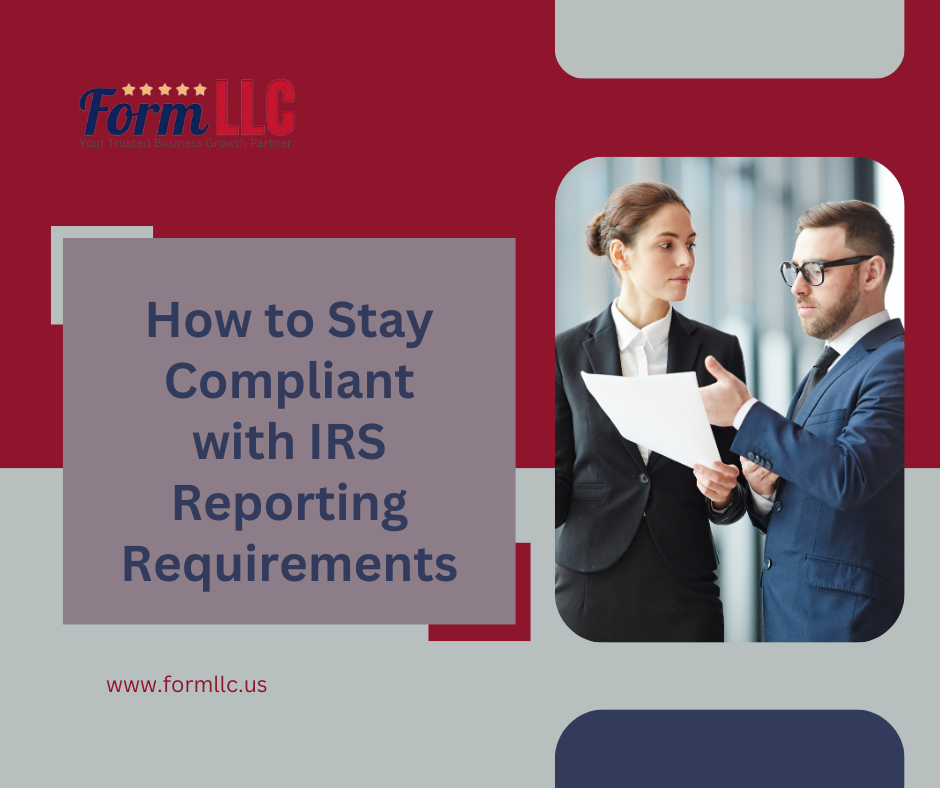
Navigating IRS reporting requirements can be complex, especially for non-resident business owners of US-based LLCs. Compliance is crucial to avoid penalties, maintain good standing, and ensure the smooth operation of your business. Here’s a guide to help you stay on top of your IRS reporting obligations and maintain compliance.
1. Know Your Filing Requirements
The first step to staying compliant is understanding what forms and reports you need to file. Depending on how your LLC is structured, the IRS may require different forms, and it’s important to know which apply to you.
- Form 1040-NR (U.S. Nonresident Alien Income Tax Return): This form is used to report US-sourced income and calculate your tax liability as a non-resident.
- Form 5472 (Information Return of a 25% Foreign-Owned U.S. Corporation or a Foreign Corporation Engaged in a U.S. Trade or Business): Required for single-member LLCs owned by a non-resident to report transactions between the LLC and its foreign owner or related parties.
- Form 1065 (U.S. Return of Partnership Income): If your LLC is treated as a partnership, this form is used to report the partnership’s income, deductions, and financial details.
2. Accurately Report All Income
Accurate income reporting is a cornerstone of compliance. The IRS requires you to report all income that is effectively connected with a US trade or business. This includes income earned from selling products, providing services, or other business activities conducted within the US.
Tips for Accurate Reporting:
- Maintain Detailed Records: Keep comprehensive records of all transactions, including invoices, receipts, and bank statements. This will help you track income accurately and provide necessary documentation in case of an audit.
- Use Reliable Accounting Software: Utilizing accounting software that automates the tracking of income and expenses can greatly reduce errors and streamline the tax filing process.
3. File Form 5472 for Foreign-Owned LLCs
One of the most critical forms for non-resident business owners is Form 5472. This form is required if you have a foreign-owned single-member LLC and engage in reportable transactions, such as capital contributions or loans, with foreign owners or related parties.
Important Points About Form 5472:
- Who Must File: Foreign-owned single-member LLCs or foreign corporations engaged in US business activities.
- Penalties for Non-Compliance: Failure to file Form 5472 can result in severe penalties, starting at $25,000 per form per year.
- Filing Deadline: Form 5472 must be submitted alongside the LLC’s tax return by the due date, typically April 15, with a possible extension until October 15.
4. Meet Estimated Tax Payment Requirements
If your business generates significant income, you may be required to make quarterly estimated tax payments to the IRS. This helps cover your expected tax liability and avoid penalties for underpayment.
Estimated Tax Deadlines:
- Payments are usually due on April 15, June 15, September 15, and January 15 of the following year.
5. Stay on Top of Deadlines
Missing filing deadlines can lead to penalties and interest charges. To avoid this, make sure you are aware of all relevant deadlines for your required forms.
Common IRS Filing Deadlines:
- Form 1040-NR: April 15, with an extension available until October 15.
- Form 5472: Due with the LLC’s annual tax return, typically April 15.
- Estimated Taxes: Quarterly throughout the year.
Setting up calendar reminders or using tax software with deadline alerts can help ensure you never miss a filing date.
6. Handle Withholding Taxes Properly
Certain types of income, such as dividends, interest, and royalties, may be subject to US withholding tax, usually at a rate of 30%. However, tax treaties between the US and your home country may reduce or eliminate this rate.
Steps to Manage Withholding:
- Use Form W-8BEN or W-8BEN-E to certify your non-resident status and claim any applicable treaty benefits to reduce withholding rates.
- Ensure proper documentation is maintained to support your claims and report withholding accurately on your tax return.
7. Keep Updated on IRS Rules and Changes
IRS rules and reporting requirements are subject to change, and staying informed is crucial for compliance. Regularly checking the IRS website, subscribing to tax newsletters, or working with a tax professional can help you keep up-to-date with the latest changes that may affect your business.
8. Work with a Tax Professional
Navigating the IRS’s complex reporting requirements can be challenging, especially for non-residents unfamiliar with US tax laws. A tax professional who specializes in international taxation can provide expert guidance, ensure you meet all filing obligations, and help you optimize your tax strategy.
Conclusion
Staying compliant with IRS reporting requirements is an essential part of running a US-based LLC as a non-resident. By understanding your filing obligations, accurately reporting income, meeting deadlines, and seeking professional guidance, you can ensure compliance and avoid costly penalties. For more insights on managing your LLC and meeting IRS requirements, visit my personal website at Tousif Akram or explore the services offered at Form LLC.